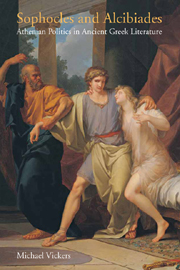Book contents
- Frontmatter
- Contents
- Preface
- 1 The mythologizing of history
- 2 Antigone, Pericles and Alcibiades
- 3 Oedipus Tyrannus, Alcibiades, Cleon and Aspasia
- 4 Ajax, Alcibiades and Andocides
- 5 Philoctetes, Alcibiades, Andocides and Pericles
- 6 Alcibiades in exile: Euripides' Cyclops
- 7 Oedipus at Colonus, Alcibiades and Critias
- 8 Critias and Alcibiades: Euripides' Bacchae
- 9 Alcibiades and Melos: Thucydides 5.84–116
- 10 Thucydides on tyrannicides: not a “digression”
- 11 Alcibiades and Persia (and more Thucydidean “digressions”)
- 12 Alcibiades and Critias in the Gorgias: Plato's “fine satire”
- Epilogue
- Bibliography
- Index locorum
- Index
Epilogue
- Frontmatter
- Contents
- Preface
- 1 The mythologizing of history
- 2 Antigone, Pericles and Alcibiades
- 3 Oedipus Tyrannus, Alcibiades, Cleon and Aspasia
- 4 Ajax, Alcibiades and Andocides
- 5 Philoctetes, Alcibiades, Andocides and Pericles
- 6 Alcibiades in exile: Euripides' Cyclops
- 7 Oedipus at Colonus, Alcibiades and Critias
- 8 Critias and Alcibiades: Euripides' Bacchae
- 9 Alcibiades and Melos: Thucydides 5.84–116
- 10 Thucydides on tyrannicides: not a “digression”
- 11 Alcibiades and Persia (and more Thucydidean “digressions”)
- 12 Alcibiades and Critias in the Gorgias: Plato's “fine satire”
- Epilogue
- Bibliography
- Index locorum
- Index
Summary
Even when specific attention was not drawn to the fact, constant use has been made throughout this book of the “wigwam argument”, according to which “each pole would fall down by itself, but together the poles stand up, by leaning on each other; they point roughly in the same direction and circumscribe ‘truth’”. Another guiding principle has been to follow W. S. Heckscher's injunction to disregard what he called “the academic frontier police” and to employ any fact, no matter how small or apparently insignificant, in reconstructing the intellectual framework within which artists and writers of the past may have worked. The working hypothesis, about the essentially Alcibiadean nature of many of the surviving plays of Sophocles seems to hold good, and to be supported by Euripides' even subtler approach, as well as by the ingenious allusions that Thucydides and Plato make to Athens' most notorious son.
Many problems with which criticism has been beset have vanished: whether the problems arising from Antigone's quirky speech at Antigone 904–20 to which Goethe took exception, or the problematic First Stasimon in the same play (332–75); the apparent inconsistencies in the plotting of Oedipus Tyrannus that so disturbed Voltaire and misled Freud's acolytes; the problem of Ajax's madness and mutability, or his impiety and untruthfulness; the problem of Odysseus' needless advertisement of his own amorality in Philoctetes, or that of Philoctetes' puzzling submission to Heracles' will; the problem of Oedipus' venomous rejection of his son Polyneices, or the reason for the Eleusinian allusions in Oedipus at Colonus, to name but a few.
- Type
- Chapter
- Information
- Sophocles and AlcibiadesAthenian Politics in Ancient Greek Literature, pp. 177 - 178Publisher: Acumen PublishingPrint publication year: 2008



